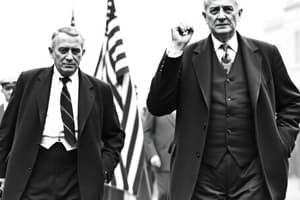Podcast
Questions and Answers
ʻOku ʻikai ke nau fakamatala ʻi he fika ʻo The Economist ki he fakaʻalofa ʻa e politikale kotoa.
ʻOku ʻikai ke nau fakamatala ʻi he fika ʻo The Economist ki he fakaʻalofa ʻa e politikale kotoa.
False (B)
The Economist ʻoku puleʻi ia ʻi he ngaahi feituʻu lelei lahi.
The Economist ʻoku puleʻi ia ʻi he ngaahi feituʻu lelei lahi.
False (B)
Ko ha meʻa fakaofoofa e The Economist ke ngaue'i ia ʻi he ngaahi feituʻu politikale.
Ko ha meʻa fakaofoofa e The Economist ke ngaue'i ia ʻi he ngaahi feituʻu politikale.
False (B)
ʻOku ʻikai ke nau fakamatala The Economist ki he liliu global.
ʻOku ʻikai ke nau fakamatala The Economist ki he liliu global.
The Economist ʻoku kei kau atu ki ha sipoti kotoa.
The Economist ʻoku kei kau atu ki ha sipoti kotoa.
Ko e ideoloji foki e The Economist ko hono hela.
Ko e ideoloji foki e The Economist ko hono hela.
Ko e kautaha 'The Economist' na'e fakatatau ki he ngaahi me'a siaine?
Ko e kautaha 'The Economist' na'e fakatatau ki he ngaahi me'a siaine?
Ko 'The Economist' na'e tala atu ki he 'Whig Party', na'e hili 'ikai?
Ko 'The Economist' na'e tala atu ki he 'Whig Party', na'e hili 'ikai?
Ko e kautaha ʻThe Economistʻ ʻoku nau faingamalieʻi hono tala ki he ngaahi meʻa siaine ʻo e 'Eua?
Ko e kautaha ʻThe Economistʻ ʻoku nau faingamalieʻi hono tala ki he ngaahi meʻa siaine ʻo e 'Eua?
'The Economist' 'oku nau ma'u atu ki he ngaahi mo'ui 'global'?
'The Economist' 'oku nau ma'u atu ki he ngaahi mo'ui 'global'?
'The Economist' 'oku nau maau atu kei mahino'i 'i he ngaahi toe fo'ou?
'The Economist' 'oku nau maau atu kei mahino'i 'i he ngaahi toe fo'ou?
'The Economist' 'oku nau malava ki hono fiema'u ke tali'i e status quo?
'The Economist' 'oku nau malava ki hono fiema'u ke tali'i e status quo?
Study Notes
Understanding The Economist: A Lens on Politics
The Economist, a globally recognized news publication, has been a leading voice in economics and finance since its inception in 1843. However, its influence extends far beyond the realms of pure economic analysis. This article will explore The Economist's approach to politics, a crucial aspect of its coverage.
A Brief History
Founded in London, The Economist began as a weekly newspaper aimed at political economy, reflecting the intellectual climate of the time. Over the centuries, the publication has remained independent, with ownership divided among a wide range of shareholders and no single stakeholder holding a majority.
The Editorial Voice
The Economist endeavors to provide a unique perspective, not bound by traditional ideologies or party lines. The publication's editorial voice is notoriously for its objectivity and rationality. While not impartial, the outlet's editorial independence allows for a broad-based approach to political analysis.
Politics in Context
The Economist excels in putting politics into a global context. The publication's articles frequently examine the interconnectedness of world politics, highlighting the interplay between economic and political events.
The Editorial Line
Politically, The Economist leans slightly towards liberalism, with a desire to promote open markets, increased globalization, and liberal democracy. This stance is not surprising, given that the publication's founders were part of the Whig Party, a liberal political group.
The Big Picture
One of the publication's most notable qualities is its ability to adopt a broad view of global politics. For example, recent coverage of the war in Ukraine has included extensive analyses of the economic ramifications, as well as the role of other global powers like China in the conflict.
Culture and Politics
The Economist is not afraid to tackle cultural issues in the context of politics. For instance, the publication examines the intersection of religion and politics, particularly the influence of religious ideologies on political actions. The Economist also offers insightful coverage of the relationship between arts and politics, often highlighting the ways in which art and culture can influence political thought and action.
A Global Perspective
The Economist's global perspective is one of its most significant strengths. The publication's editors and writers are stationed across the world, providing a diverse range of opinions and perspectives that allow for a nuanced understanding of global events.
A Critical Voice
The Economist is not always afraid to challenge the status quo. The publication's writers often offer critique of political figures and policies, providing readers with a balanced perspective on current events. The Economist aims to be a critical voice in global politics, providing readers with the information they need to make informed decisions.
A Well-Informed Audience
The Economist's audience is typically well-informed, educated, and interested in global politics. This allows the publication to offer more in-depth coverage that goes beyond the surface-level details of world events. The Economist understands its audience and provides them with the information they need to make informed decisions about global politics.
Conclusion
The Economist offers a unique and insightful perspective on global politics. The publication's ability to provide a broad-based approach to political analysis, combined with its global perspective, makes it an invaluable resource for anyone interested in world events. Whether you're a seasoned political analyst or a curious learner, The Economist can offer you a fresh perspective on the complex world of global politics.
Studying That Suits You
Use AI to generate personalized quizzes and flashcards to suit your learning preferences.
Description
The Economist provides a unique perspective on global politics, encompassing a broad-based approach to political analysis and a global viewpoint. Explore its history, editorial voice, political context, and critical stance in this insightful article.




